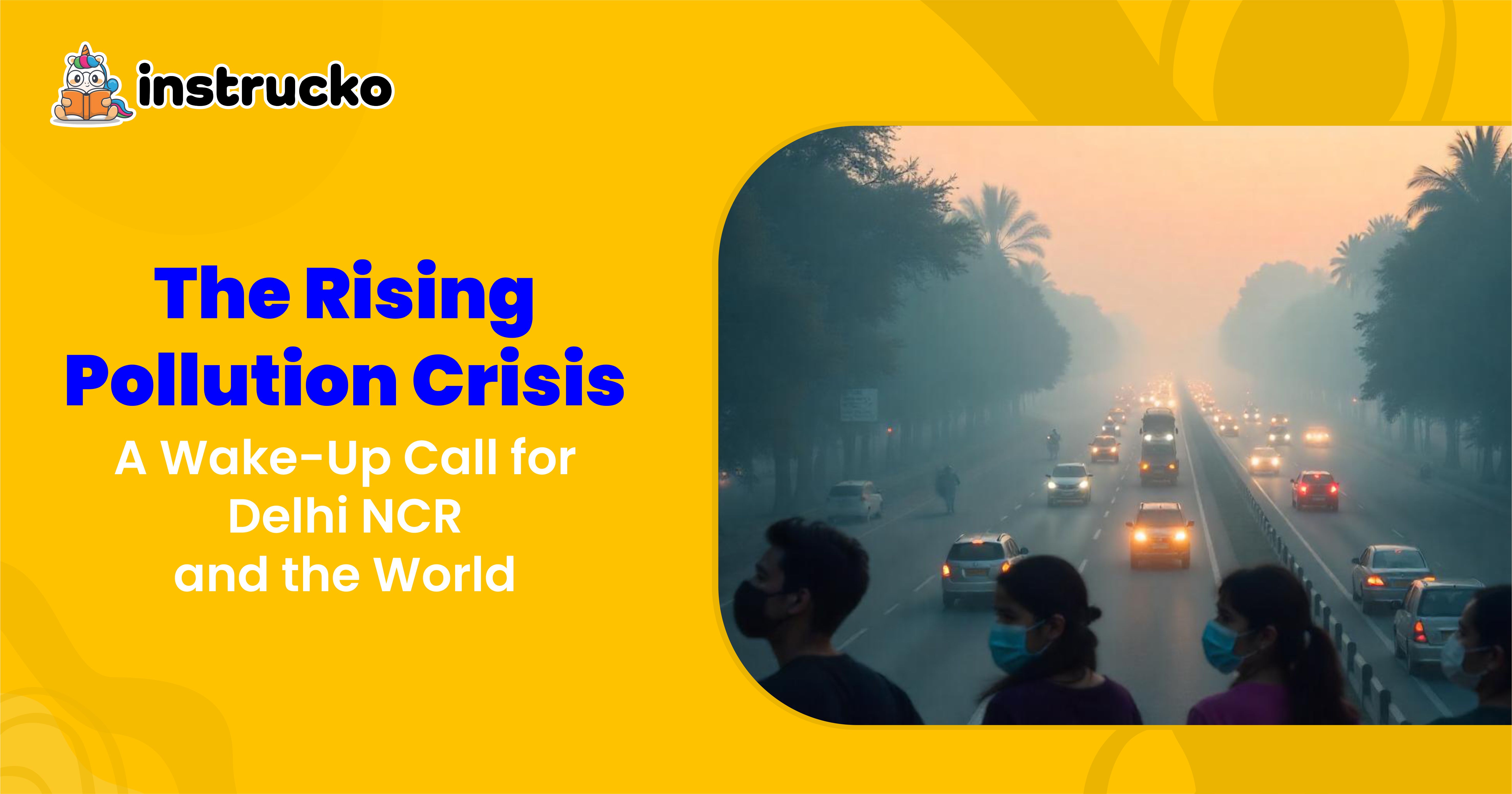Every morning in Delhi NCR, millions of us wake up to a skyline shrouded in a thick layer of smog. The once crisp, clear air now carries a weight that is not just physical but emotional—an unspoken reminder of the growing crisis of pollution. This is not just Delhi NCR’s story; it’s a global reality. From London to Beijing, pollution has become one of the most pressing challenges of our time.
But what exactly is pollution, and why has it escalated to such alarming levels? More importantly, what can we do about it? Let’s dive deep into the issue, understand its impact, and explore actionable steps to mitigate it.
Understanding Pollution: A Global Epidemic
Pollution refers to the contamination of our environment—air, water, and land—by harmful substances or energy. It disrupts ecosystems, endangers human health, and accelerates climate change.
The Air We Breathe
Air pollution is arguably the most visible and immediate form of pollution. In Delhi NCR, the air quality often falls into the "hazardous" category, with PM2.5 levels (fine particulate matter) exceeding safe limits. Globally, the World Health Organization (WHO) reports that 99% of people breathe air containing pollutants far above acceptable levels.
Sources of air pollution include:
Vehicles: Exhaust fumes from millions of cars and motorcycles release nitrogen oxides and carbon monoxide.
Industries: Factories spew toxic chemicals and greenhouse gases into the air.
Burning of Fossil Fuels: Coal-fired power plants and domestic cooking fuels are major culprits.
Agricultural Practices: Stubble burning in northern India adds to Delhi’s infamous winter smog.
Water and Land Pollution
While air pollution grabs headlines, water and land pollution are equally destructive. Rivers like the Yamuna in Delhi are choked with industrial waste and untreated sewage, threatening aquatic life and communities that depend on them. On a global scale, the oceans are drowning in plastic, with an estimated 8 million tonnes entering them each year.
Landfills are overflowing with non-biodegradable waste, and hazardous chemicals seep into the soil, impacting agriculture and groundwater.
The Impact of Pollution
Pollution doesn’t just harm the planet; it harms us directly.
Health Hazards
Respiratory Issues: Long-term exposure to polluted air can cause asthma, bronchitis, and even lung cancer.
Heart Diseases: Studies link high pollution levels to an increased risk of heart attacks and strokes.
Mental Health: Emerging research suggests a connection between pollution and cognitive decline, including in children.
Environmental Consequences
Climate Change: Greenhouse gases like carbon dioxide trap heat, causing global temperatures to rise.
Loss of Biodiversity: Toxic environments drive countless species to extinction.
Soil Degradation: Contaminated land becomes infertile, threatening food security.
Delhi NCR: A Case Study of Pollution
Delhi NCR has become synonymous with pollution, especially during the winter months. The capital's "pollution season" begins in October, triggered by stubble burning in neighbouring states, compounded by firecrackers during festivals, and stagnant winds trapping pollutants.
Key statistics to consider:
Delhi ranked as the world’s most polluted capital in 2023.
The annual Air Quality Index (AQI) often surpasses 500, with safe levels being below 50.
Approximately 54,000 premature deaths in Delhi NCR were linked to air pollution in 2022.
Pollution Beyond Delhi: A Global Emergency
While Delhi often takes the spotlight, cities worldwide are grappling with similar challenges:
Beijing, China: Known for its "airpocalypse," Beijing struggles with industrial emissions and vehicular pollution.
Los Angeles, USA: Smog in LA is a result of its dense traffic and geography that traps pollutants.
London, UK: Despite significant progress, air pollution from vehicles and wood-burning stoves remains a concern.
Dhaka, Bangladesh: Frequently ranks as one of the world’s most polluted cities due to industrial emissions and poor waste management.
What Can Be Done? Solutions for a Cleaner Future
The good news is that pollution is not an unsolvable problem. It requires collective action from governments, industries, and individuals.
Government Policies and Regulations
Stricter Emission Norms: Enforcing stringent limits on vehicle and industrial emissions.
Incentivising Green Energy: Subsidising solar, wind, and other renewable energy sources.
Improved Public Transport: Expanding metro systems and introducing electric buses to reduce reliance on private vehicles.
Corporate Responsibility
Sustainable Practices: Companies must adopt cleaner production techniques.
Waste Management: Industries should recycle and dispose of waste responsibly.
Individual Actions
Switch to Green Transport: Walk, cycle, or use public transport whenever possible. Electric vehicles are also a great option.
Reduce Plastic Usage: Carry reusable bags, bottles, and cutlery to minimise plastic waste.
Conserve Energy: Turn off appliances when not in use, and consider installing solar panels.
Participate in Tree Plantations: Trees absorb carbon dioxide and release oxygen, acting as natural air filters.
Educate and Advocate: Raise awareness about pollution in your community and push for change.
Global Movements and Innovations
The fight against pollution is gaining momentum worldwide:
The Paris Agreement: A global pact to combat climate change and reduce greenhouse gas emissions.
Circular Economy: A shift towards recycling and reusing resources to minimise waste.
Technology Solutions: From electric cars to air purifiers, innovation is helping reduce pollution levels.
A Shared Responsibility
Pollution is not someone else’s problem; it’s everyone’s. The air we breathe, the water we drink, and the land we live on connect us all.
While the challenge is immense, so is our capacity for change. As individuals, let’s take small, meaningful steps. As communities, let’s demand better policies and cleaner technologies. And as global citizens, let’s work together to protect our planet for future generations.
The time to act is now. Let’s not wait for the skies to clear or the rivers to flow clean again. Let’s be the change-makers who ensure that they do.
Your Turn
What steps are you taking to combat pollution in your daily life? Share your thoughts and ideas in the comments below. Together, we can inspire change!










